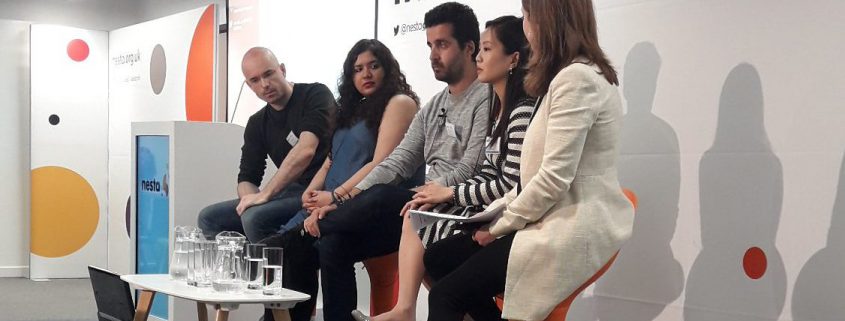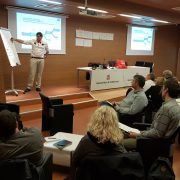Innovació Social Digital: On ens trobem?
Els dies 16 i 17 de maig, la Fundació i2CAT va participar en les jornades “What next for Digital Social Innovation?”, organitzades per Nesta, el think-tank pioner en innovació social, a Londres. Durant les jornades es va analitzar com està funcionant el sector de la innovació social digital (DSI, per les seves sigles en anglès) i quines són les passes a seguir per parts dels ens involucrats de cara a avançar en un sector on la tecnologia és l’eina principal per resoldre els problemes als quals ens enfrontem com a societat.
Alguns dels resultats obtinguts van ser:
- Hi ha gairebé 2.000 organitzacions i més de 1.000 projectes treballant en DSI a tota Europa.
- Malgrat això, hi ha pocs exemples d’iniciatives DSI d’impacte real. El creixement del sector està aturat a causa de barreres a escala sistèmica i a escala de projecte.
- La connexió entre projectes i organitzacions DSI és escassa. Hi ha una urgent necessitat de col·laboració i creació de xarxes.
- El creixement del sector DSI està condicionat per la falta de finançament i inversió a tota Europa.
- Les organitzacions de la societat civil i el sector públic estan adoptant la innovació social digital molt lentament.
- Existeixen dificultats per involucrar els ciutadans i els usuaris, entendre i mesurar l’impacte de les seves innovacions socials digitals, i planificar el creixement i la sostenibilitat.
Podeu llegir l’article sencer en anglès a continuació.
Digital Social Innovation: Where are we now?
Josep M. Miró, Digital Social Innovation Project Manager, Fundació i2CAT
On May 16th and 17th, Fundació i2CAT participated in a workshop convened in London by NESTA, a leading social innovation think-tank, to assess how digital social innovation is doing as a sector, and which steps we need to follow as practitioners to move forward in this field in which technology is used as a major lever to solve the problems and issues we face as a society. This event was part of a DSI4EU project which has been mapping the initiatives and organizations in Europe using technology to tackle social challenges. You can explore the data on projects and organizations on www.digitalsocial.eu.
A major topic that emerged at the conference was an exploration why digital social innovation is not growing at the pace and speed we all expect, given the potential it has to accelerate change processes for the advancement of society as a whole. DSI is still a nascent field, just coming into existence and beginning to display signs of future potential. Despite widespread activity, the conclusion seems to be that few initiatives have grown to deliver impact at scale, to be institutionalized, or to become “the new normal”.
A few years ago, when we were pushing for reforms in the social or Third Sector, we were involved in the promotion of an ecosystem that gave rise to the popularity of social entrepreneurs, social business, and later on social innovation. The DSI sector could benefit significantly by considering the lessons learned and good practices from previous efforts at promoting and supporting a new ecosystem, such as:
- Spend time defining good problems to solve
- Unconventional partnerships with traditional non-profits
- Adoption of new business models
- Measure, measure, measure impact
- Philanthropic investments
- Public sector involvement
- Invest in building ecosystem-supporting institutions
- Allow room for disruption, but stay connected
For those of us coming from the social innovation sector, it feels quite unnatural that social innovators and digital social innovators are not sitting at the same table and speaking the same language, sharing the same goals. Innovation sometimes can be quite threatening for established stakeholders in the social sector, but it is the bread and butter of social entrepreneurs and social innovators worldwide. Here perhaps we have an immense opportunity to get them engaged and on board of such a fantastic initiative, DSI, that is just barely showing its potential to bring about societal change at scale.
Below you will find some of the key findings and policy recommendation produced by NESTA, which are contained in this publication: http://www.nesta.org.uk/publications/what-next-digital-social-innovation-realising-potential-people-and-technology-tackle-big-challenges#sthash.Z1exlURM.dpuf
KEY FINDINGS
There are almost 2,000 organizations and over 1,000 projects involved in digital social innovation (DSI) across Europe, with the highest concentration of activity in Western and Southern Europe.
Despite this activity, there are relatively few examples of DSI initiatives delivering impact at scale. The growth of DSI is being held back by barriers at the system level and at the level of individual projects.
Projects and organizations involved in DSI are still relatively poorly connected to each other. There is a pressing need to grow strong networks within and across countries and regions to boost collaboration and knowledge-sharing.
The growth of DSI is being held back by lack of funding and investment across the continent, especially outside Western Europe, and structural digital skills shortages.
Civil society organizations and the public sector have been slow to adopt DSI, despite the opportunity it offers them to deliver better services at a lower cost, although there are emerging examples of good practice from across Europe.
Practitioners struggle to engage citizens and users, understand and measure the impact of their digital social innovations, and plan for growth and sustainability.
POLICY RECOMMENDATIONS
Support DSI through funding mechanisms. Private and public funders of social innovation should ensure that DSI organizations and projects are able, and encouraged, to access funding.
Invest in intermediaries and the support infrastructure for DSI. Currently, some large-scale investment goes to individual projects while the majority of projects miss out. Focusing instead on investment in infrastructure such as incubators, accelerators, network-building, physical hubs and training initiatives would enable a more decentralized system capable of supporting a wider range of DSI initiatives.
Invest in and enable DSI approaches within existing civil society organizations. Private and public financial support for DSI should not only focus on startups and grassroots organizations, but also on improving digital maturity in established civil society organizations and supporting DSI initiatives within them.
Enable peer learning and the spread of best practice. The European Commission should continue to invest in peer learning and knowledge-sharing initiatives, both online and offline. This must happen not only between practitioners but also between funders, policymakers and investors.
Conduct further research into the supporting conditions and models for growth and sustainability of DSI. The European Commission should support research into the enabling conditions of DSI and growth and sustainability models for DSI initiatives.





